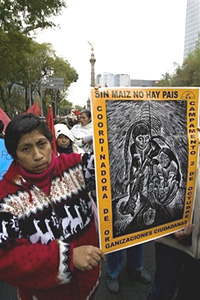
|
 |
 |
 News Around the Republic of Mexico | January 2008 News Around the Republic of Mexico | January 2008  
Mexico's Peasant Farmers Demand Protection from Cheap U.S. Imports
 David Agren - The Ottawa Citizen David Agren - The Ottawa Citizen
go to original


| | A Mexican farmer, holding a poster that reads in Spanish 'Without corn there is no country', protests the end of import protections for their country's corn and bean crops in Mexico City, Wednesday, Jan. 2, 2008. (AP/Eduardo Verdugo) | | |
Mexico City - The recent removal of tariffs on corn and bean imports so upset Fernando Gonzalez, an indigenous corn farmer from a remote corner of Oaxaca state, that he travelled more than 10 hours to Mexico City to vent his anger outside the U.S. Embassy last week.

"This change is going to throw many people off of their land," he said while marching down the capital's grand Paseo de la Reforma.

"There's no (other) work, there's not much of anything so people will leave for the other side" of the border, he added.

White corn, beans, sugar cane and powdered milk began entering Mexico duty free on Jan. 1 as mandated by the 14-year-old NAFTA agreement. The change has provoked concern that many of the country's 30 million campesinos (farmworkers) will be driven from their modest plots of land by a flood of cheap agricultural imports flowing south from highly subsidized U.S. competitors.

Nationwide protests have been carried out since New Year's Day, with one group even blocking the busy El Paso-Juarez border crossing. The country's largest campesino group, which called a national day of action on Jan. 31, estimated the NAFTA changes will negatively affect 1.4 million farmers. And a joint commission of Congress passed a non-binding resolution on Jan. 4 urging President Felipe Calderon to reopen NAFTA negotiations.

But Mr. Calderon rebuffed calls to renegotiate NAFTA, saying that Canada and the United States now buy "five times more" agricultural products from Mexico than in 1994.

Agriculture Secretary Alberto Cárdenas Jimémez echoed the president's assessment of NAFTA and rejected the gloomy predictions of campesinos decamping the countryside in large numbers. He pointed to the largely uneventful lifting of tariffs on 40 agricultural items in 2003 as proof that past forecasts of turmoil in the countryside were unfounded.

Even corn production, a staple that nourished Mesoamerican civilization for centuries, is flourishing as Mexico now harvests more of the crop than when NAFTA was implemented 14 years ago. Corn production jumped from 18 million tons to 33 million tons in 2007, according to the Agriculture Secretariat. Productivity also improved, with corn yields increasing from the less than two tons per hectare in 1994 to 2.9 tons last year.

Alberto Diaz-Cayeros, a political science professor at Stanford University, agreed with the Mexican government's NAFTA assessments, noting that exports and productivity in the agricultural sector have increased and that poverty indicators in the countryside have dropped modestly. He also says NAFTA ushered in structural changes in rural Mexico, where the previously long-ruling Institutional Revolutionary Party (PRI) had organized many landless peasants into largely unproductive collectives known as ejidos and used surrogates to marshal the campesino vote come election time.

"This idea that things would be flooded or that all agricultural producers would disappear overnight I think was a little bit overrated," Mr. Diaz-Cayeros said. "It's not as obvious that the livelihood of the poor is as threatened as it might have been 15 years ago."

The National Campesino Confederation (CNC), the nation's largest farm group, estimated that NAFTA has already injured five million farmers, the majority of whom work small plots of less than two hectares and often lack modern equipment. CNC spokesman Guillermo Correa figured that NAFTA only benefitted two per cent of Mexican producers, who mainly grow export crops like strawberries, avocados and winter vegetables.

The CNC, an organization long affiliated with the PRI, also complained that the Mexican government has dismantled a number of agricultural programs over the past 20 years that extended credit, provided supplies and bought crops.

Many of the programs were riddled with corruption and support often only flowed to campesinos backing the PRI, according to Mr. Diaz-Cayeros. He added that the federal government has increased its agricultural spending in recent years through a program known as Procampo, which gives farmers small stipends with few strings attached.

Aldo Munoz, a political science professor at Mexico City's Iberoamericana University, said large producers claim most of the government subsidies, but the funds sent to small farmers "deactivates protests" in rural areas.

But Pedro Galicia, a machete-wielding farmer also marching in Mexico City, was unhappy with the levels of support he was receiving and promised to keep fighting NAFTA.

"This is simply going to provoke more misery throughout the country," he said. | 
 | |
 |



